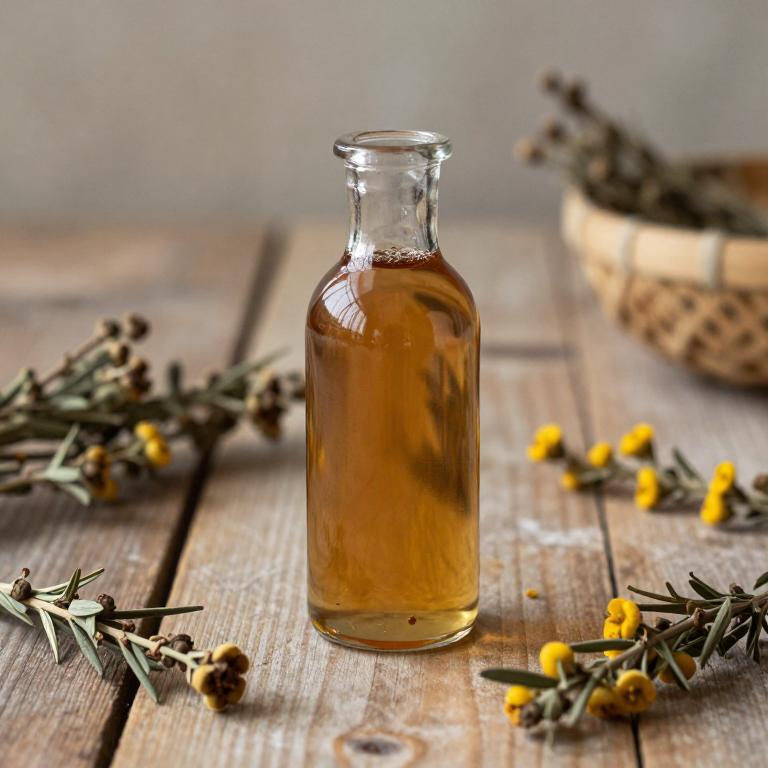10 Best Herbal Syrups For Gout

Herbal syrups for gout are natural remedies that aim to alleviate the symptoms of gout by reducing inflammation and uric acid levels in the body.
These syrups often contain ingredients like turmeric, ginger, willow bark, and devil's claw, which are known for their anti-inflammatory and pain-relieving properties. While they are generally considered safe, they should not replace prescribed medications without consulting a healthcare professional. Herbal syrups may offer a gentler alternative for individuals seeking complementary treatments for gout.
However, their effectiveness can vary, and it is important to ensure they are free from allergens and safe for long-term use.
Table of Contents
- 1. Common grape (Vitis vinifera)
- 2. Turmeric (Curcuma longa)
- 3. Licorice (Glycyrrhiza glabra)
- 4. Thistle (Silybum marianum)
- 5. Ginger (Zingiber officinale)
- 6. Indian barberry (Berberis aristata)
- 7. Rhubarb (Rheum palmatum)
- 8. Field horsetail (Equisetum arvense)
- 9. Blessed thistle (Cnicus benedictus)
- 10. Stinging nettle (Urtica dioica)
1. Common grape (Vitis vinifera)

Vitis vinifera, commonly known as the grape vine, has been traditionally used in herbal medicine for its potential benefits in managing gout.
Herbal syrups derived from Vitis vinifera are believed to possess anti-inflammatory and antioxidant properties that may help reduce uric acid levels in the body. These syrups are often made by extracting compounds from the leaves, berries, or seeds of the grape vine, which are rich in polyphenols and resveratrol. Some studies suggest that these compounds may support kidney function and aid in the excretion of uric acid, which is a key factor in gout management.
However, it is important to consult a healthcare professional before using Vitis vinifera herbal syrups, as they may interact with other medications or have side effects.
2. Turmeric (Curcuma longa)

Curcuma longa, commonly known as turmeric, has been widely studied for its potential benefits in managing gout due to its anti-inflammatory and antioxidant properties.
Herbal syrups made from curcuma longa are often used as a natural remedy to help reduce uric acid levels and alleviate joint pain associated with gout. These syrups typically contain curcumin, the active compound in turmeric, which may inhibit inflammatory pathways in the body. While some studies suggest that curcuma longa may support gout management, it is important to consult a healthcare provider before using it as a complementary therapy.
Overall, curcuma longa herbal syrups offer a promising, though not a standalone, approach to supporting gout treatment when used alongside conventional medical care.
3. Licorice (Glycyrrhiza glabra)

Glycyrrhiza glabra, commonly known as licorice, has been traditionally used in herbal medicine for its anti-inflammatory and analgesic properties.
Licorice root syrup, derived from the dried root of this plant, contains glycyrrhizin, a compound believed to help reduce uric acid levels in the body, which is a key factor in gout. While some studies suggest that glycyrrhizin may inhibit the enzyme responsible for uric acid production, more research is needed to confirm its efficacy for gout management. Due to its potential to cause side effects such as hypertension and fluid retention, licorice syrup should be used with caution and under the guidance of a healthcare professional.
Despite its traditional use, it is not a substitute for conventional gout treatments and should be integrated into a comprehensive management plan.
4. Thistle (Silybum marianum)

Silybum marianum, commonly known as milk thistle, is a herbal remedy that has been studied for its potential benefits in managing gout.
The herbal syrup derived from this plant contains silymarin, a group of flavonoids with antioxidant and anti-inflammatory properties. Some research suggests that silymarin may help reduce uric acid levels in the blood, which is a key factor in the development of gout. However, while preliminary studies show promise, more clinical trials are needed to confirm its effectiveness and safety for gout management.
It is often used as a complementary therapy alongside conventional treatments, but individuals should consult with a healthcare provider before incorporating it into their regimen.
5. Ginger (Zingiber officinale)

Zingiber officinale, commonly known as ginger, has been traditionally used for its anti-inflammatory and pain-relieving properties, making it a potential natural remedy for gout.
Ginger herbal syrups are often prepared by simmering fresh ginger root in sugar and water, creating a soothing and easy-to-consume form of the herb. These syrups may help reduce uric acid levels and alleviate joint pain associated with gout due to ginger’s ability to inhibit inflammatory pathways. However, while some studies suggest ginger may offer symptomatic relief, it is not a substitute for medical treatment in managing gout.
It is advisable to consult a healthcare provider before using ginger syrups, especially for individuals with diabetes or those on medication, to ensure safety and effectiveness.
6. Indian barberry (Berberis aristata)

Berberis aristata, also known as Indian barberry, contains the active compound berberine, which has been traditionally used in Ayurvedic medicine for its anti-inflammatory and antimicrobial properties.
Herbal syrups made from Berberis aristata are sometimes used as a natural remedy for gout due to their potential to reduce uric acid levels and inflammation in the joints. These syrups may help alleviate symptoms such as swelling, pain, and stiffness associated with gout by supporting the body's natural detoxification processes. However, it is important to consult with a healthcare professional before using Berberis aristata syrups, as they may interact with certain medications or have side effects in some individuals.
While some studies suggest berberine may be beneficial for metabolic health, more research is needed to fully understand its efficacy and safety for gout management.
7. Rhubarb (Rheum palmatum)

Rheum palmatum, also known as Chinese rhubarb, is traditionally used in herbal medicine for its potent anti-inflammatory and detoxifying properties.
When formulated into a herbal syrup, it is often employed to support the body's natural processes in managing gout, a condition characterized by high uric acid levels and painful joint inflammation. The syrup may help promote the elimination of uric acid through the kidneys and liver, thereby reducing the risk of gout flare-ups. However, due to its strong laxative effects, it should be used under the guidance of a qualified healthcare provider to avoid potential side effects.
While some individuals may find relief from symptoms using Rheum palmatum syrup, it is not a substitute for conventional medical treatments for gout.
8. Field horsetail (Equisetum arvense)

Equisetum arvense, commonly known as field horsetail, has been traditionally used in herbal medicine for its diuretic and anti-inflammatory properties.
Herbal syrups made from Equisetum arvense are often recommended for managing gout due to their ability to help eliminate uric acid from the body. These syrups may support kidney function and reduce inflammation associated with gouty arthritis. However, it is important to consult a healthcare professional before using Equisetum arvense, as it can interact with certain medications and may have side effects.
While some studies suggest potential benefits, more research is needed to fully establish its efficacy for gout management.
9. Blessed thistle (Cnicus benedictus)

Cnicus benedictus, also known as blessed thorn, has been traditionally used in herbal medicine for its potential anti-inflammatory and diuretic properties, which may support the management of gout.
Herbal syrups made from Cnicus benedictus are believed to help reduce uric acid levels in the body, a key factor in gout flare-ups. While some studies suggest that the plant may aid in detoxification and support kidney function, more research is needed to confirm its efficacy for gout treatment. These syrups are often prepared with other herbs to enhance their therapeutic effects, and they are typically taken as a complementary approach to conventional gout management.
However, individuals should consult with a healthcare provider before using Cnicus benedictus syrups, especially if they are on medication or have underlying health conditions.
10. Stinging nettle (Urtica dioica)

Urtica dioica, commonly known as stinging nettle, has been traditionally used in herbal medicine for its potential anti-inflammatory and diuretic properties, making it a candidate for supporting gout management.
When prepared as a syrup, Urtica dioica may help reduce uric acid levels in the body, which is a key factor in the development of gout. This herbal syrup is believed to aid in the elimination of toxins and excess uric acid through increased urination. However, it is important to consult with a healthcare provider before using it, as it may interact with certain medications or have side effects in some individuals.
While some studies suggest potential benefits, more research is needed to fully understand its efficacy and safety for gout treatment.